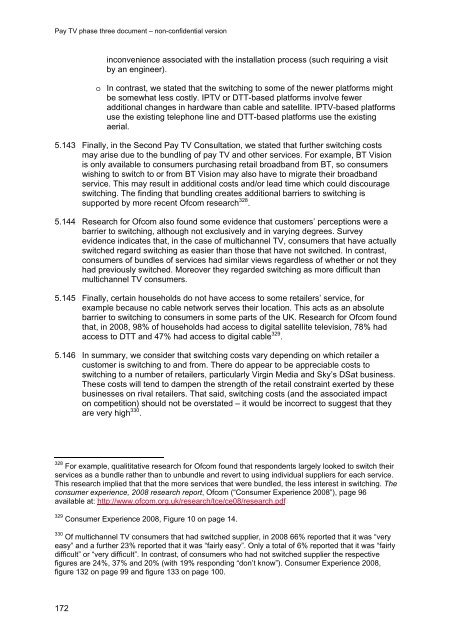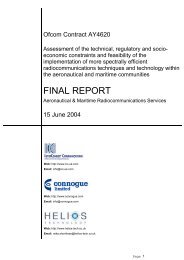Pay TV phase three document - Stakeholders - Ofcom
Pay TV phase three document - Stakeholders - Ofcom
Pay TV phase three document - Stakeholders - Ofcom
Create successful ePaper yourself
Turn your PDF publications into a flip-book with our unique Google optimized e-Paper software.
<strong>Pay</strong> <strong>TV</strong> <strong>phase</strong> <strong>three</strong> <strong>document</strong> – non-confidential version<br />
172<br />
inconvenience associated with the installation process (such requiring a visit<br />
by an engineer).<br />
o In contrast, we stated that the switching to some of the newer platforms might<br />
be somewhat less costly. IP<strong>TV</strong> or DTT-based platforms involve fewer<br />
additional changes in hardware than cable and satellite. IP<strong>TV</strong>-based platforms<br />
use the existing telephone line and DTT-based platforms use the existing<br />
aerial.<br />
5.143 Finally, in the Second <strong>Pay</strong> <strong>TV</strong> Consultation, we stated that further switching costs<br />
may arise due to the bundling of pay <strong>TV</strong> and other services. For example, BT Vision<br />
is only available to consumers purchasing retail broadband from BT, so consumers<br />
wishing to switch to or from BT Vision may also have to migrate their broadband<br />
service. This may result in additional costs and/or lead time which could discourage<br />
switching. The finding that bundling creates additional barriers to switching is<br />
supported by more recent <strong>Ofcom</strong> research 328 .<br />
5.144 Research for <strong>Ofcom</strong> also found some evidence that customers’ perceptions were a<br />
barrier to switching, although not exclusively and in varying degrees. Survey<br />
evidence indicates that, in the case of multichannel <strong>TV</strong>, consumers that have actually<br />
switched regard switching as easier than those that have not switched. In contrast,<br />
consumers of bundles of services had similar views regardless of whether or not they<br />
had previously switched. Moreover they regarded switching as more difficult than<br />
multichannel <strong>TV</strong> consumers.<br />
5.145 Finally, certain households do not have access to some retailers’ service, for<br />
example because no cable network serves their location. This acts as an absolute<br />
barrier to switching to consumers in some parts of the UK. Research for <strong>Ofcom</strong> found<br />
that, in 2008, 98% of households had access to digital satellite television, 78% had<br />
access to DTT and 47% had access to digital cable 329 .<br />
5.146 In summary, we consider that switching costs vary depending on which retailer a<br />
customer is switching to and from. There do appear to be appreciable costs to<br />
switching to a number of retailers, particularly Virgin Media and Sky’s DSat business.<br />
These costs will tend to dampen the strength of the retail constraint exerted by these<br />
businesses on rival retailers. That said, switching costs (and the associated impact<br />
on competition) should not be overstated – it would be incorrect to suggest that they<br />
are very high 330 .<br />
328 For example, qualititative research for <strong>Ofcom</strong> found that respondents largely looked to switch their<br />
services as a bundle rather than to unbundle and revert to using individual suppliers for each service.<br />
This research implied that that the more services that were bundled, the less interest in switching. The<br />
consumer experience, 2008 research report, <strong>Ofcom</strong> (“Consumer Experience 2008”), page 96<br />
available at: http://www.ofcom.org.uk/research/tce/ce08/research.pdf<br />
329 Consumer Experience 2008, Figure 10 on page 14.<br />
330 Of multichannel <strong>TV</strong> consumers that had switched supplier, in 2008 66% reported that it was “very<br />
easy” and a further 23% reported that it was “fairly easy”. Only a total of 6% reported that it was “fairly<br />
difficult” or “very difficult”. In contrast, of consumers who had not switched supplier the respective<br />
figures are 24%, 37% and 20% (with 19% responding “don’t know”). Consumer Experience 2008,<br />
figure 132 on page 99 and figure 133 on page 100.
















